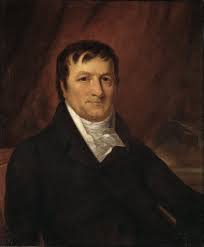Get Today in Masonic History into your Inbox. Sign up today for one of our email lists!
Need an article for your Trestleboard/Newsletter see our Use Policy
John Jacob Astor Passes Away

Today in Masonic History John Jacob Astor passes away in 1848.
John Jacob Astor was a German-born American businessman.
Astor was born in Waldorf, Germany near Heidelberg on July 17th, 1763. He was born Johann Jakob Astor. He was the youngest of 4 brothers. He began his business career in Germany as a dairy salesman for his fathers business.
In 1779, when he was 16, he moved to London where his brother had a musical instrument shop. He worked for his brother in London. He also learned to speak English and anglicized his name.
In 1784, he immigrated to the United States just after the Revolutionary War. Initially he helped one of his other brothers establish a butcher shop. He eventually started trading furs with Native Americans in the late 1780's. In New York City he established a fur shop and sold instruments for his brother back in London.
He was a horse racing enthusiast. He purchased a thoroughbred named Messenger. The horse became the sire of the Standardbred breed of horses which is commonly used in trot or pace harness racing.
In 1794, he started trading with Canada for furs. He imported them to the United States and then sell them in Europe. By 1807, the United States Embargo Act prevented him from further trading with Canada. With the blessing of Thomas Jefferson, Astor created the American Fur Company. Some of the owners of the company were Canadians, this allowed him to get around the Embargo. During this time, he opened trade with China.
In 1799, he began acquiring land on the waterfront in New York City. He was convinced, correctly, New York City was going to become one of the largest cities in the World. He began buying other land as well and in the 1830's saw the boom coming in New York City and bought land, even outside the then city limits. He never settled or used any of the land himself, instead renting it out to others for their use.
After the War of 1812, the United States passed a ban on foreign fur traders, this allowed the American Fur Company to dominate the market in the United States.
When Astor finally decided to retire he was arguably the richest man in the United States. In adjusted 2006 U.S. dollars it is believed he was worth $110.1 Billion. This made him the 5th richest man ever in the United States. In 2011 adjusted dollars it is estimated he was worth a more conservative figure of $1.272 Billion. He used his wealth to support cultural endeavors. He was a supporter of ornithologist John James Audubon.
When he passed away on March 29th, 1848, his will provided $400,000 for the establishment of the Astor Library, which after merging with other smaller libraries become the New York Public Library. He also provided money to create an orphanage in his home town of Waldorf. The orphanage is now a museum honoring Him.
Astor was a member of Holland Lodge No. 8 in New York City. In 1788, he served as Worshipful Master of the lodge. He later became the Grand Treasurer for the Grand Lodge of New York.
This article provided by Brother Eric C. Steele.

